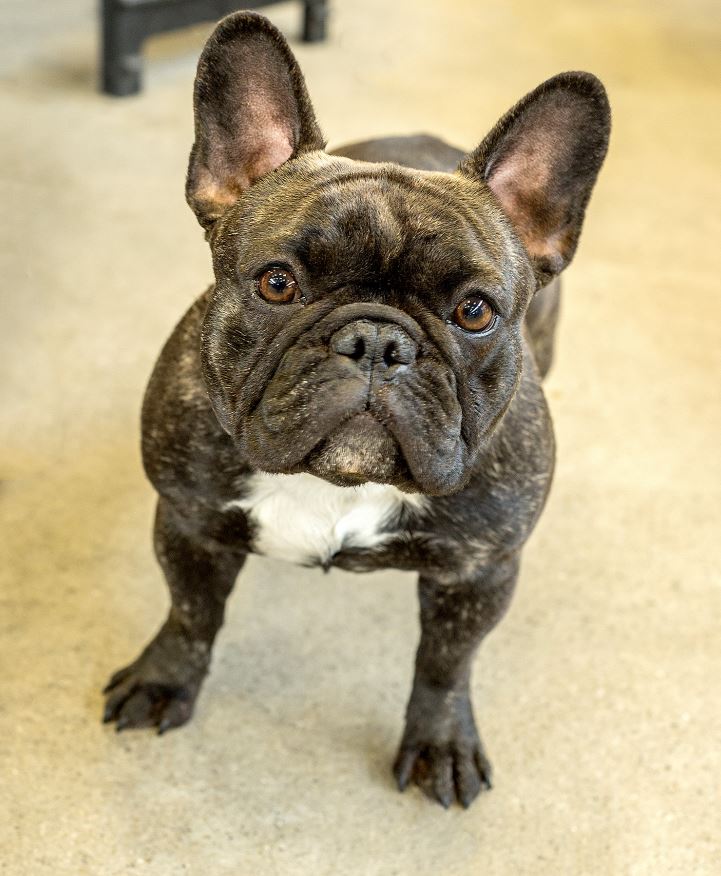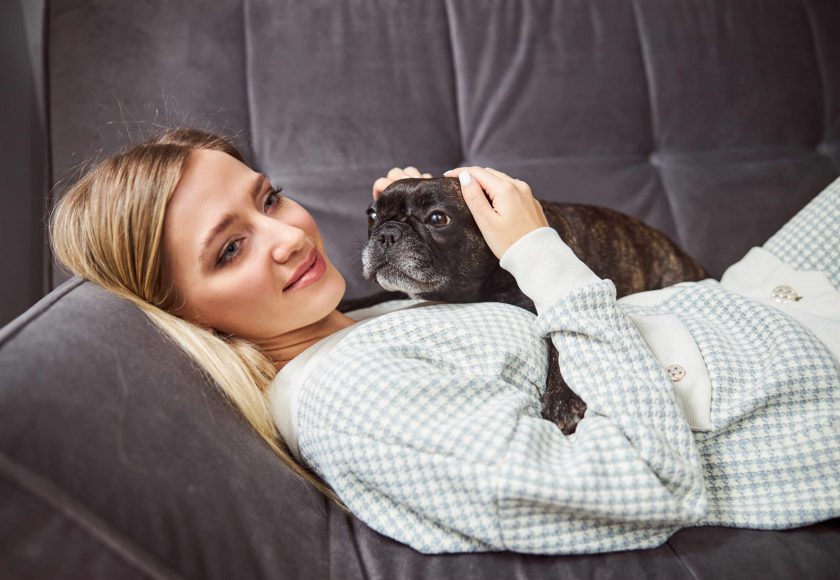If you have a French bulldog, you’re probably aware that they shake quite a bit! As a worried pet parent who wants only the best for their furry friend, you probably wonder whether something is wrong when you see their back legs shaking.
The truth is, there are instances when it’s completely normal – or expected – and there are cases that call for concern.
If you want to help your dog, it’s essential to learn the difference between the two.
Don’t fret, though – we’ve got you covered with our detailed guide!
So, if you’ve ever thought to yourself, “My French bulldog back legs are shaking, how can I help them?“ keep reading to find out!

What Causes Tremors In Dog’s Legs?
A French bulldog might shake or tremble for a variety of causes. They might do so because they are:
Cold
If you take your French bulldog for a walk on a chilly day and see that they shake and shiver, you should buy them a coat. And when the temperatures drop, be sure you use it.
You wouldn’t leave the house without one, so why should your dog?
A Frenchie’s fur is relatively short and not particularly insulating. So, your French bulldog’s likely trembling and shivering so much because it’s too chilly for them. And if you’re inside and they’re shaking, turn up the heat or partially cover them with a blanket.
Shaking is how a dog boosts its body temperature in this scenario.
A pro tip:
Softly touching the inside of your Frenchie’s ear is an easy way to check whether your Frenchie is too chilly. But don’t go too far with your finger!
Your dog is chilly if their ear feels cold to the touch. Cuddle them since your body heat will help them warm up.
If you can’t afford to keep the house warm all day in the winter, make sure your Frenchie has a comfortable bed – or create a comfy sleeping area with warm blankets.
It won’t take long for your shivering bulldog to thaw up if you put them in their bed or wrap them up in blankets.
After an hour, use the ear technique to check your pooch’s temperature to see if it has changed – and keep an eye on your pup to make sure they warm up.
Nervous
A ride in the car, a trip to the veterinarian, or loud noises can all make a dog uneasy. This form of shaking typically lasts only as long as the source of their nervousness.
Anxious
Anxiety could cause a French bulldog to shake, and it might be triggered by a specific event or just a general sense of fear or uneasiness.
Another thing to keep an eye out for is whether they’re panting. That might indicate that they are worried and uncomfortable.
That’s when you should thoroughly check your Frenchie to see if there are any evident concerns – but be careful not to make them even more uncomfortable.
Are they apprehensive about moving?
If your dog moves yet looks to be off-balance, it might be a spine problem – and you should seek medical help as soon as possible.
Overly Excited
When your French bulldog is overstimulated and becomes very enthusiastic, they may tremble.
If this occurs, sit with your Frenchie and allow them to calm down. Be careful to remain relaxed so that your dog will sit still until the shaking stops.
In Pain
If there aren’t any evident explanations for your Frenchie’s trembling, it’s possible that they’re in pain. We’d recommend calling your vet, describing the symptoms, and maybe scheduling a visit.
Sick
A French bulldog’s trembling might be caused by a disease, as well. There are several things pet parents could do to find out if that’s the case.
It’s a good idea to buy a pet thermometer so that you can check your Frenchie’s temperature immediately if you fear they are sick.
A dog’s usual temperature ranges from 37.8°C (100°F) to 39.3°C (102.7°F). If it’s higher than that, you should consult a veterinarian.
If you can’t see any obvious problems and your dog’s sole symptom is shaking, it couldn’t hurt to give it 24 hours to see if things improve on their own.
Poisoned
Poisoning symptoms in dogs vary based on the type of poison consumed. Vomiting, trembling, difficulty breathing, and drooling are some symptoms to keep in mind.
Dogs are easily poisoned by chocolate, which causes excitement and trembling. Don’t waste any time and go to your veterinarian right away if you suspect poisoning.
Fearful
It’s not uncommon for Frenchies to have reservations about certain things. If your Frenchie pup is afraid of something, be careful not to overreact.
If there’s anything you could do to avoid it, do so. If not, simply comfort them gently and let them see you going about your business as usual.
Some fear-triggers include fireworks, thunder, gunshots, vet visits, car rides – yes, they get car sick – and anything that is new and unfamiliar.
Old
As dogs age, they’re more likely to develop issues that can be observed as physical trembling.
It’s normal for your Frenchie to shake as they get older. It might be due to joint pain – but don’t assume it’s always related to their age.

How Serious Are The Symptoms?
Tremors restricted to the back legs that develop only when your French bulldog attempts to control these limbs are more likely the result of a non-emergency – but could still point to some concerning scenarios.
If the tremors appear to come on quickly and involve the entire body, suspect poison ingestion, epilepsy, or some systemic problem that needs immediate veterinarian attention.
Whatever the case, if you notice your Frenchie is shaking, pay special attention and look for any changes in their general health or behavior – no matter how minor.
How To Treat French Bulldog Shaking?
If your dog’s back legs are shaking and you believe there is a reason for concern, take them to the vet. They can do a variety of tests and diagnostic procedures to figure out what’s causing it.
X-rays might reveal joint abnormalities, while laboratory tests could reveal pollutants, electrolyte imbalances, or metabolic issues like hypoglycemia.
Persistent discomfort, muscular weakness, or neurological dysfunction that impairs the strength and stability of your dog’s back legs could benefit from medical therapy.
Any medical treatment has to be prescribed by your vet – as much as you want to help your dog, you’re not doing them a favor by playing doctor. That’s the area where your vet knows best!
When To See A Vet
Dogs quiver and shake for a variety of causes – including excitement, discomfort, old age, and even sickness.
Yes, shivering and shaking might indicate a significant problem. So, if your dog suddenly begins trembling or shivering, keep an eye out for additional symptoms such as diarrhea, vomiting, and limping.
If you’re worried that something’s wrong and you’ve ruled out all the obvious causes – like a cold house or winter weather – call your vet right away.
Better safe than sorry, right?




